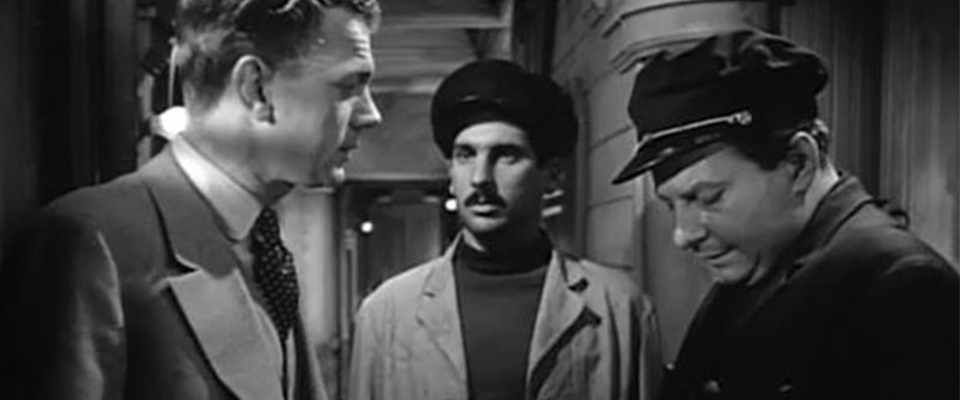Here’s a scene worth picturing on Veterans Day: It’s 1951. McCarthyism has reached a fever pitch, and the House Un-American Activities Committee (HUAC), already keeping watch on Orson Welles, has trained its sights on one of Welles’ close friends.
His name is Robert Meltzer—a UC Berkeley graduate-turned-Hollywood-screenwriter who, through biting send-ups of the status quo, has made his leftist leanings clear.
When it comes to rabble-rousers, Meltzer keeps good company. Not only has he worked with Welles on several projects, he has also collaborated with Charlie Chaplin, another provocative film-world bigwig with a fat government file.
Meltzer ruffled campus feathers by signing off on five pages of socialist artwork and decrying what he saw as his generation’s unthinking march toward military conflict.
In a climate of suspicion, the HUAC blacklists Meltzer, adding him to its roster of perceived homegrown foes.
There’s just one thing.
On the day his name is read into the Congressional record, denounced as an enemy of his own country, Meltzer has been dead for seven years, killed while serving in the U.S. Army, fighting fascism overseas.
It’s an absurd detail, like something out of Joseph Heller’s Catch-22, and a curious coda in the biography of Second Lt. Robert F. Meltzer, UC Berkeley class of ’36.
Born in Oakland in 1914, Meltzer was the fifth of six children to Russian Jewish immigrants. Growing up in the East Bay, he was both a Boy Scout and a budding thespian, active in local stage productions. He studied French and jazz piano. He liked to write, and did it well.
In 1932, his first year at Berkeley, he was the only freshman on the yearbook staff. As a sophomore, he joined the editorial board of The California Pelican, the campus humor magazine. By his senior year he was the Pelican’s editor-in-chief.
In that role, Meltzer ruffled campus feathers by signing off on five pages of socialist artwork. He also penned a polarizing editorial in which he railed against bigotry in America and decried what he saw as his generation’s unthinking march toward military conflict.
With the bombing of Pearl Harbor, the U.S. was drawn into World War II, and Meltzer, an often unrepentant critic of his country, rose unabashedly to its defense.
“So here we are,” he wrote, “sound in mind and limb, waiting for the joyous moment when we can answer ‘our country’s call’ and, girding our loins with the most recent of diabolical scientific devices, saunter into the fray with the express purpose of butchering our fellow men.”
Two years after graduating, Meltzer migrated to Carmel. He tested his chops as a sketch writer and stage actor, frequently appearing alongside his then-girlfriend, Dorothy Comingore, a fellow Cal alum and future screen star.
Their big break occurred when Chaplin, vacationing in Pebble Beach, caught one of their shows. According to a 2017 account in Written By, a magazine published by the Writers Guild of America, Chaplin was “reduced to tears” by Comingore’s performance and charmed by Meltzer’s “wit and feverish political brilliance.” He urged them both to relocate to Hollywood.
Meltzer earned a credit as an assistant director on The Great Dictator, Chaplin’s comedic take-down of fascist Germany (although he opposed Chaplin’s famous soliloquy at the end). He also found his way into Welles’ orbit, becoming a collaborator and friend. On Welles’ behalf, he traveled to Brazil to conduct research for a documentary film called It’s All True. Though the movie went unfinished, another Welles project, Journey into Fear, soon made it into theaters. Meltzer had a cameo, playing a ship’s steward, dark-haired and handsome, with a neatly groomed mustache.
Meltzer’s career was on the march (ditto for Comingore, who landed a prominent role in Citizen Kane), but so were dangerous forces overseas.
With the bombing of Pearl Harbor, the United States was drawn into World War II, and Meltzer, an often unrepentant critic of his country, rose unabashedly to its defense. In the fall of 1942, he drafted a letter to Welles, proposing a radio show designed to rally public sentiment around the wartime effort with humanizing tales about the engineers who built, and the pilots who flew, America’s military aircraft. Within a few months, Welles produced such a show.
“We have actually only one test by which to judge our actions: will we be contributing by them to the defeat and eradication of Fascism?”
But Meltzer wasn’t around to be a part of it. By then, he had enlisted in the Army, heeding the very call he mocked at the Pelican.
Ever the writer, Meltzer was a prolific wartime correspondent, dashing off notes to family and friends that brimmed with the wit Chaplin found so charming. In a telegram to Welles, sent from Camp Polk in Louisiana, Meltzer noted dryly that “with respect to life here can only say Louisiana Purchase a mistake.”
In another dispatch, he relayed his exchange with one of the squad leaders, a “bald, bow-legged, and ribald” former copper miner. “I asked him if he were married. Divorced, he said. Why, I asked. Oh, she was a lazy son of a bitch, he said; every time I went to piss in the kitchen sink it was filled with dirty dishes. Under that kind of leadership this squad will obviously win the war and the peace.”
Beneath these breezy missives lay a seriousness of cause, which Meltzer made plain in a letter to a nephew, dated Oct. 10, 1943. “We have actually only one test by which to judge our actions: will we be contributing by them to the defeat and eradication of Fascism?”
The following summer, he shipped overseas, having been, he wrote, “indoctrinated as hell.”
Meltzer joined the 2nd Ranger Battalion, and, soon after, took charge of the 1st Platoon in Able Company, tasked, in part, with spearheading sweeps of the French countryside to round up German prisoners.
On August 15, 1944, Welles sent his Army friend a letter. “Dear Old Bob: I don’t know whether I owe you this or not, but I’m writing it in the hope of another of your happy letters, and some word of your health and whereabouts. I have no news worth a soldier’s attention—Yours to command, Orson.”
“I think about him a lot in relation to our notions of heroism,” says Meltzer’s grandniece Jennifer Bowman. “We tend to think of heroes as fitting a certain mold, but that’s not how it works.”
The letter went unanswered.
Less than a week later, while leading his platoon near Le Folgoet, in Brittany, Meltzer was caught in a German ambush and killed by machine gun fire.
It was later reported that his last words were uttered in jest, meant to lift the spirits of his comrades: “Best darn football match I ever had.” Like most last words, these carry a strong whiff of legend, sounding more like a line from a Hollywood script than the words of a dying soldier. Perhaps that’s fitting.
Meltzer was 30 years old when he died, and his sacrifice earned him a Purple Heart. It also inspired the Robert Meltzer Award, established in 1947 by the Screen Writers Guild to honor writers killed in battle. The award was given out four years in a row, until 1951, when HUAC slapped Meltzer with the posthumous insult. His name blacklisted, the award was mothballed. (Comingore, too, was blacklisted, her acting career soon finished. She died in 1971.)
It took another 40 years before the Writers Guild revived Meltzer’s eponymous award “in recognition of a singular act of courage in defense of freedom of expression and the rights of the writer.” In 1991, it was given to Kirk Douglas, who insisted that blacklisted writer Dalton Trumbo be credited for his work on Spartacus.
Trumbo himself eulogized Meltzer from the stage in 1970 while accepting a different Writer’s Guild award. He mentioned that Meltzer left “behind an infant christened Jo Victory, which is a nice name for a soldier’s daughter to bear.” Jo’s whereabouts today are uncertain, but her father’s name lives on in the stories of relatives who never met him.
“I think about him a lot in relation to our notions of heroism,” says Meltzer’s grandniece Jennifer Bowman, an Air Force veteran who lives in Virginia. She has written movingly about her great-uncle on her personal blog, From this Perch.
“We tend to think of heroes as fitting a certain mold, but that’s not how it works. The truth is, it takes all kinds.”



















